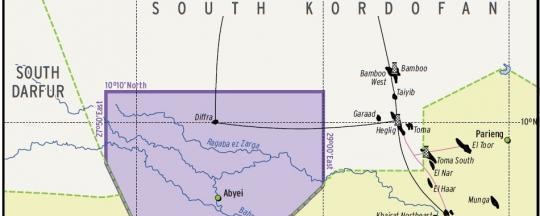Traders and customers have accused the Abyei Area Administration (AAA) of worsening the fuel crisis by attempting to control prices. They say that imposing a maximum price for a jerrycan of diesel means traders will either not sell their stocks or will stop bringing fuel to Abyei.
Many services and businesses are grinding to a halt as supplies dry up. Some water pumps in the area are also standing idle because they depend on diesel for their motors.
But the AAA says traders are waging an economic war against it, and its rules have been misinterpreted. Officials have been seizing fuel from sellers whom they accuse of ‘hoarding’ supplies.
Abyei Today reported that some people in Abyei want the Abyei Area Administration to bring supplies of diesel to Abyei so that there was no ‘black market’ while others wanted the AAA to allow traders to charge whatever they wished. They thought the free market would drive down prices.
One fuel seller, Lual Wol, said traders were scared to bring in supplies when they knew their fuel might be confiscated if they refused to sell it at a low price. The deputy chairperson of the Agok chamber of commerce, Wol Kolnin, said he wanted a meeting with the AAA to discuss the issue. He said that if the price cap stayed, traders would stop bringing fuel to Abyei.
But the AAA’s deputy chief administrator, Deng Bol Athuai, said traders were hiding fuel in an attempt to restrict supply and force up prices. He accused traders of waging an indirect, economic war. He said the administration had so far confiscated 300 jerrycans and nine drums of fuel.
He said the maximum selling price of 180 SSP per jerrycan applied only to fuel brought from Abyei Town, and not to supplies brought from further afield.
Meanwhile, people in Agok report that nine water pumps are at a standstill because there is no diesel to power them. Residents have had to turn to hand pumps as an alternative, but say these cannot cope with demand.
Abyei Today reported from Aniet market in Agok that a hundred empty jerrycans were on the ground, and the pump was not working. Its owner, Monyluak Ajak, said he had managed to get a few liters of diesel, but those supplies had run out.
In Makhazin, west of Agok, people have to walk half a kilometer to the nearest pump. Residents told us they were exhausted after working at home in the morning, then fetching four jerrycans of water in the heat of the afternoon. The hand pump they used tended to produce stagnant water.
The shortage of water has affected other businesses. Aboud Abdul Rahaman owns a public latrine and shower in Aniet market. Aboud said he had shut the shower operation, but was managing to buy enough water from a solar-operated pump to keep the latrine going without raising prices.
The director-general of the AAA’s ministry of physical infrastructure and public utilities, Arop Nyok Monyjiei, said efforts were being made to secure fuel for the pumps, but there was little available.




